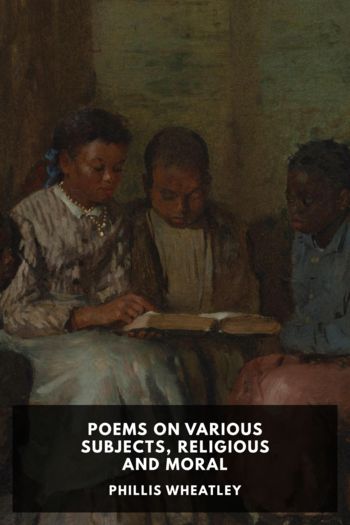The Autobiography of Benjamin Franklin - Benjamin Franklin (pocket ebook reader .txt) 📗

- Author: Benjamin Franklin
Book online «The Autobiography of Benjamin Franklin - Benjamin Franklin (pocket ebook reader .txt) 📗». Author Benjamin Franklin
In truth, I found myself incorrigible with respect to Order; and now I am grown old, and my memory bad, I feel very sensibly the want of it. But, on the whole, though I never arrived at the perfection I had been so ambitious of obtaining, but fell far short of it, yet I was, by the endeavour, a better and a happier man than I otherwise should have been if I had not attempted it; as those who aim at perfect writing by imitating the engraved copies, though they never reach the wished-for excellence of those copies, their hand is mended by the endeavour, and is tolerable while it continues fair and legible.
It may be well my posterity should be informed that to this little artifice, with the blessing of God, their ancestor owed the constant felicity of his life, down to his seventy-ninth year, in which this is written. What reverses may attend the remainder is in the hand of Providence; but, if they arrive, the reflection on past happiness enjoyed ought to help his bearing them with more resignation. To Temperance he ascribes his long-continued health, and what is still left to him of a good constitution; to Industry and Frugality, the early easiness of his circumstances and acquisition of his fortune, with all that knowledge that enabled him to be a useful citizen, and obtained for him some degree of reputation among the learned; to Sincerity and Justice, the confidence of his country, and the honorable employs it conferred upon him; and to the joint influence of the whole mass of the virtues,71 even in the imperfect state he was able to acquire them, all that evenness of temper, and that cheerfulness in conversation, which makes his company still sought for, and agreeable even to his younger acquaintance. I hope, therefore, that some of my descendants may follow the example and reap the benefit.
It will be remarked that, though my scheme was not wholly without religion, there was in it no mark of any of the distinguishing tenets of any particular sect. I had purposely avoided them; for, being fully persuaded of the utility and excellency of my method, and that it might be serviceable to people in all religions, and intending some time or other to publish it, I would not have anything in it that should prejudice anyone, of any sect, against it. I purposed writing a little comment on each virtue, in which I would have shown the advantages of possessing it, and the mischiefs attending its opposite vice; and I should have called my book “The Art of Virtue,”72 because it would have shown the means and manner of obtaining virtue, which would have distinguished it from the mere exhortation to be good, that does not instruct and indicate the means, but is like the apostle’s man of verbal charity, who only without showing to the naked and hungry how or where they might get clothes or victuals, exhorted them to be fed and clothed.—James 2:15, 16.
But it so happened that my intention of writing and publishing this comment was never fulfilled. I did, indeed, from time to time, put down short hints of the sentiments, reasonings, etc., to be made use of in it, some of which I have still by me; but the necessary close attention to private business in the earlier part of my life, and public business since, have occasioned my postponing it; for, it being connected in my mind with a great and extensive project, that required the whole man to execute, and which an unforeseen succession of employs prevented my attending to, it has hitherto remained unfinished.
In this piece it was my design to explain and enforce this doctrine, that vicious actions are not hurtful because they are forbidden, but forbidden because they are hurtful, the nature of man alone considered; that it was, therefore, everyone’s interest to be virtuous who wished to be happy even in this world; and I should, from this circumstance (there being always in the world a number of rich merchants, nobility, states, and princes, who have need of honest instruments for the management of their affairs, and such being so rare), have endeavoured to convince young persons that no qualities were so likely to make a poor man’s fortune as those of probity and integrity.
My list of virtues contained at first but





Comments (0)